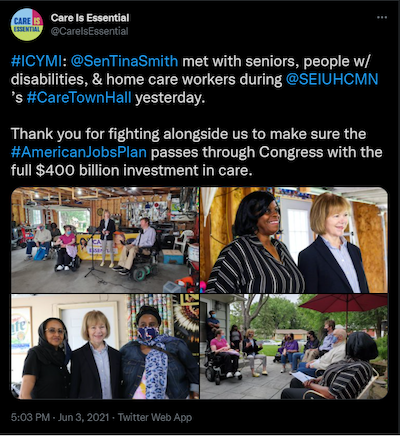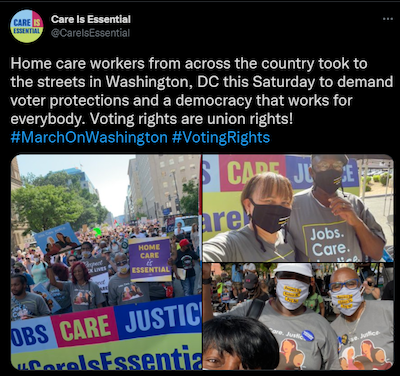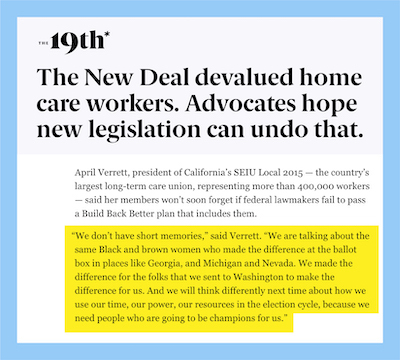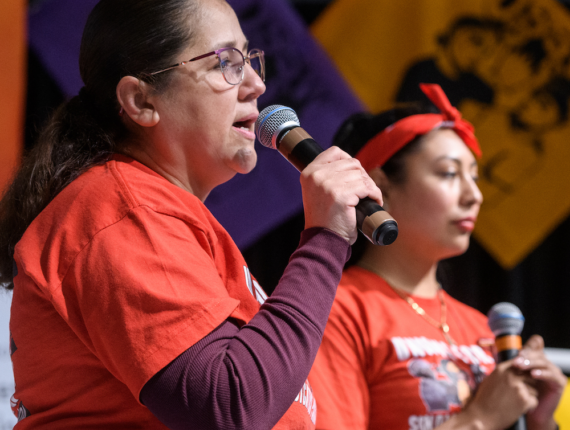
Across the country, home care workers are demanding Congress pass Build Back Better, with an essential investment in the care economy. This wildly popular investment in care will lead to real change for home care workers, including good union jobs, and families in need of high-quality, accessible care.
Action for Care
Our leaders must understand the critical role home care workers play in helping our children, seniors and neighbors living with disabilities lead healthy, dignified lives within the safety of their homes. This pandemic has underscored the need for our most vulnerable to have more access to home care, limiting their exposure to COVID-19.
Over the past several months, we participated in many direct actions to amplify home care worker and consumer experiences and educate members of Congress about home care.

Care workers and consumers participated in over 10 Walk-A-Day events, where Virginian Lt. Governor candidate Hala Ayala and members of Congress, including Representatives Pramila Jayapal and Josh Harder, witnessed first-hand home care experiences.

Over 19 in-person and virtual town halls enabled members of Congress, including Senators Tina Smith and Tammy Baldwin as well as Representatives Cory Bush and Frank J. Mrvan, consumers and home care workers to discuss the impacts a meaningful investment in care would create.

In 20 cities across the U.S. hundreds of consumers and home care workers rallied to show their support of Biden’s Build Back Better plan and essential care investments. We also held virtual rallies and invited members of Congress to attend.

Home care workers, consumers, and allies made hundreds of calls to members of Congress.

Consumers, allies, and home care workers signed petitions to persuade Congress to act. SEIU Locals 2015, HCII, and 1199N joined grassroots disability rights group ADAPT to deliver over 4.5 million petition signatures to Senator Bob Casey in support of care investments.
Home Care Workers and Consumers Speak Out
Home care workers, people receiving home care, and their families know that it’s time for home care workers to be compensated and respected like the essential workers they are.
Home care went from front pages to airwaves as fans of the famed podcast The Daily joined the Care Is Essential campaign and mobilized to reach out to Congress and champion their support of Biden’s Build Back Better bill’s care investment.
Listen here.
Voters Across Parties Support Care
We heard from voters from across parties and learned that voters overwhelmingly want Congress to invest in care!
- 81% support major investments in home care
- 78% want long term care included in Biden’s Build Back Better plan
- 85% want Congress to act to create quality, affordable home care
Furthermore:
- An AARP survey found that 3 out of 4 seniors want to remain in their home as they age, making home care a valuable resource and service for this group.
- Data for Progress released a poll that echoes voter support for investments in long term care and other Build Back Better provisions, such as universal pre-K and pathway to citizenship.
- Navigator Research announced polling results that showed 2 in 3 Americans back provisions in the Build Back Better plan, including 3 out of 5 independent voters.
- The Care Can’t Wait Coalition surveyed 12 states and found that voters, across parties, support an investment of $400 billion over 10 years in long term care.
And it’s not just voters who are talking about home care.

Source: Read the full article from the New York Times here

Source: Read the full article from the 19th here

Source: Read the full article from Vox here
It’s Time to Deliver
With Congress back in session, D.C. and surrounding neighborhoods were dressed in digital advertising, emphasizing widespread support of care.

Home care workers and consumers tell their stories in video ads, like the one below, which features Scott Lancianese, a former Coal Miner and stroke survivor who relies on home care.

The message is clear: It’s time for Congress to invest in home care to create good union jobs and expand access to care.


